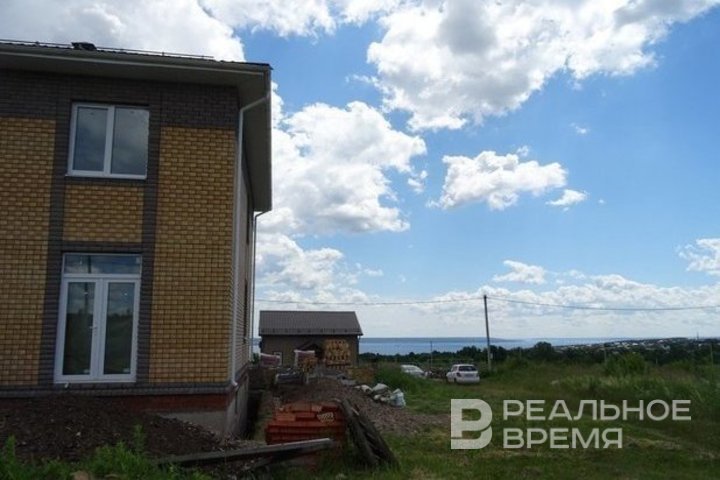Individual housing developers hope that the national standard will put an end to unauthorised construction
However, this will significantly increase the cost of building private homes

In August, a “green” standard for the construction of private houses came into force in Russia — it is not yet mandatory to follow it, but the industry believes that everything can change. The document includes 45 criteria that a building must meet in order to be recognised as environmentally friendly. It is based on the existing standard for blocks of flats, although it has more criteria (81). According to the Russian Statistics Service, more than half of the housing commissioned in the country is low-rise construction, so the state decided to develop similar standards for individual housing construction. Realnoe Vremya investigated how the innovation will change the suburban real estate market and whether it will affect the cost of individual homes.
“There are no strict requirements to follow the green standard”
The introduction of the standard for individual housing construction is now at the first stage of the project. Most developers surveyed by Realnoe Vremya have not even heard of the green standard for individual housing construction, and the law does not require compliance with it, so why follow it? The innovation came into force in August. Ramil Usmanov, President of the Federation of Individual Housing Construction, spoke in more detail about what this standard is and what are the benefits of building houses in accordance with its requirements:

The standard includes a number of requirements for the design, construction and operation of residential buildings. It covers such aspects as energy efficiency, waste management and the creation of a comfortable urban environment. The main idea is to make individual housing construction more sustainable and environmentally friendly.
“At the moment, there are no strict requirements in Russian legislation that oblige all developers to follow the green standard. However, I believe that the regulatory framework is gradually developing, and, perhaps, in the future the requirements for environmental sustainability of construction will become stricter, and developers will have to take its requirements into account when designing and building their houses,” Usmanov emphasised.

The expert admits that working within the green standard can lead to an increase in initial construction costs, since many environmentally friendly materials and technologies are more expensive than traditional ones. However, he is convinced that these investments can pay off in the long term due to reduced operating costs. Energy-efficient houses can significantly reduce heating and electricity costs, which will ultimately make them more economical.
Certification for compliance with the standard is carried out by a special organisation, which must be included in the register of operators. If a house receives a high rating, the customer and contractor can claim various bonuses. For example, the contractor will receive a cheaper loan under escrow financing, and the customer will receive a cheaper mortgage. In addition, the standard serves as a guideline for the development of individual housing construction projects.
“Exclude from the game those who try to circumvent the rules for their own benefit”
Developers themselves have different opinions on the new rules for the construction of private houses. Founder of ArmA STROY construction company Ramis Mullabayev does not see any difficulties associated with the introduction of the new standard. In his opinion, this will only force unscrupulous developers out of the market: “I think it will help clear the market of unscrupulous contractors. They are the ones who offer cheaper materials and services that do not meet the declared characteristics.”
The speaker believes that in order to improve their image, developers will strive to follow the standard, and this will eliminate from the game those who try to circumvent the rules for their own benefit, and protect the end consumer from low-quality construction. Thus, the client will be protected from possible problems in the future. At the same time, the innovation will inevitably lead to an increase in the cost of building individual houses:

As an example, developers cite a material popular today in the construction of economical houses — this is a vibro-pressed block with aerated concrete crumbs for 62 rubles per piece. At the same time, a more modern and environmentally friendly ceramic block will cost about 180 rubles per piece. The cost of building a house from ceramic blocks will increase by half a million rubles.
For those who want to comply with the green standard in individual housing construction, the costs will definitely increase, another developer, founder of Khansky Dom company Ilyas Gimadov agrees with his colleague:

According to him, some developers on the market already work only with environmentally friendly materials and comply with all technologies, while their colleagues save on materials and do not adhere to the standards. “This is where the wide price range comes from. Some houses cost 10-12 million rubles, while others can be bought for 7-8 million. If the green standard is finally introduced, houses will become more expensive by about 20-30%. But it would be more correct to say that the cost will be equalised because all developers will have to build with high quality,” the developer is convinced.
“Will an ordinary consumer be able to afford buying a green house?”
According to Director of Master Doma company Ruslan Kasimov, the introduction of new rules may lead to the construction of individual houses becoming too expensive for Tatarstan residents who will not be able to afford these costs.

According to Ruslan Kasimov, legislators should first think about how to debug the system of introducing the escrow account mechanism when buying individual houses. This problem is more urgent, he believes:
“If last year I could still work as a developer and sell houses through a mortgage, now difficulties are arising. Now I can only act as a contractor. And the client himself bears a significant financial burden — a person willing to buy a house through a mortgage is obliged to first pay the bank a down payment, and this is about 1.5 million rubles, not everyone has that kind of money. I am not against escrow, it helps to protect clients. But we need to think through and adjust the process. Let the banks not require an initial payment, but give it to the contractor so that work can begin. And then issue money from the account in stages, after the foundation, walls and roof are completed. Now the contractor must first do everything at his own expense and only receive the money upon completion. And if a person does not have money for an initial payment, he will not see a house,” concluded the interlocutor of the newspaper.